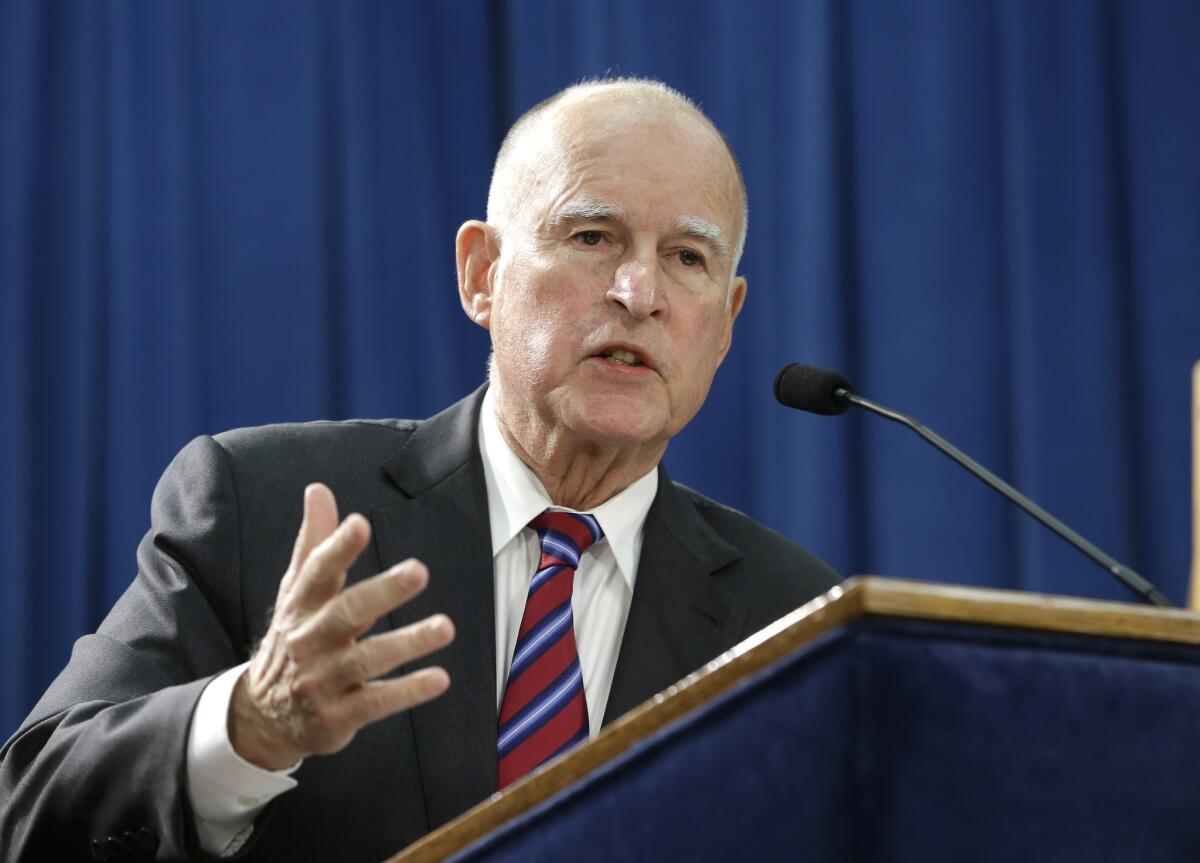California Supreme Court seems likely to allow parole ballot measure to move ahead

The California Supreme Court heard arguments Thursday on whether to clear the way for Gov. Jerry Brown’s proposed initiative to reduce California’s prison population to go on the November ballot.
The California Supreme Court appeared inclined Thursday to clear the way for a November ballot measure allowing the early release of some prison inmates.
The case carries high stakes for the state’s criminal justice system and Gov. Jerry Brown’s political legacy. It will test Brown’s effort to grant parole to perhaps thousands of inmates serving time for nonviolent felonies.
But the crux of the legal fight is whether officials properly followed state election law. That law requires amendments to a ballot measure be “reasonably germane” to the purpose of the original measure.
During a hearing, several justices of the state high court suggested that Atty. Gen. Kamala Harris had acted properly in allowing Brown to amend an initiative that had dealt solely with juvenile justice.
“It seems pretty clear to me that the Legislature wanted to give great latitude to the proponents of any initiative,” said Justice Carol A. Corrigan.
Chief Justice Tani Cantil-Sakauye observed that “reasonably germane” could be a broadly defined term.
“It is hard to imagine an amendment to a proposal that would not be reasonably germane,” she said.
Brown unveiled his plan in late January, too late to start the initiative process from the beginning and still qualify for the Nov. 8 statewide ballot.
Instead, his campaign team added the parole provisions to an existing proposed ballot measure on juvenile justice.
That the amendments were allowed at all was a result of a law signed by Brown in 2014 to revamp the ballot initiative process. That law also requires that proposed initiatives be posted for public comment for 30 days. At the end of that period, proponents then have five more days to make any final changes.
Brown’s amendments were made in the 35th day, after the public comment period had expired.
Justice Ming W. Chin expressed concern that the original proposed initiative would merely have amended existing laws, while Brown’s revision would amend the California Constitution, a change that would be much harder to reverse.
“When you propose a constitutional amendment, it seems to me you would want the public to put in their two bits’ worth,” Chin said.
But other justices said the Legislature clearly knew it was not providing for public comment on amendments when it passed the election law.
“The overall design of the statute is to leave the proponents in the driver’s seat,” Justice Goodwin Liu said. “The real public forum for this kind of thing is the signature-gathering process and, ultimately, the vote.”
Brown’s proposal is intended to ensure California’s future compliance with a federal court mandate to reduce overcrowding in the state’s prisons.
His amendments would create a constitutional right to parole. Inmates whose primary conviction was nonviolent would be entitled to early release, provided they enroll in prison education programs or find other ways to earn enough good behavior credits.
Analysts say the changes would give prosecutors less power in negotiating plea bargains.
The California District Attorneys Assn. challenged the initiative in court and won the first legal battle in February.
Brown and Harris then appealed to the high court, and the governor’s campaign team was allowed to begin gathering voter signatures while the seven justices weighed the ultimate fate of the measure.
The initiative will qualify for the ballot if backers gather at least 585,407 voter signatures and have them certified before June 30.
Political watchers believe the final ruling in the case will send a strong signal about the practical impact of the 2014 law that changed the initiative process.
In the past, attorneys general have been given wide latitude to prepare ballot measures for signature gathering. Should Harris and Brown prevail, that role may include almost unilateral power to accept or reject last-minute changes.
Corrigan suggested that the court should defer to the judgment of the attorney general, unless it is “beyond the realm of reason.”
Twitter: @mauradolan
Twitter: @johnmyers
ALSO:
LAPD hacked into iPhone of slain wife of ‘Shield’ actor, documents show
Urth Caffe owner hires lawyer to fight Muslim women’s discrimination allegations
Raising smoking age to 21 should ease peer pressure on California’s kids, backers say
More to Read
Sign up for Essential California
The most important California stories and recommendations in your inbox every morning.
You may occasionally receive promotional content from the Los Angeles Times.












